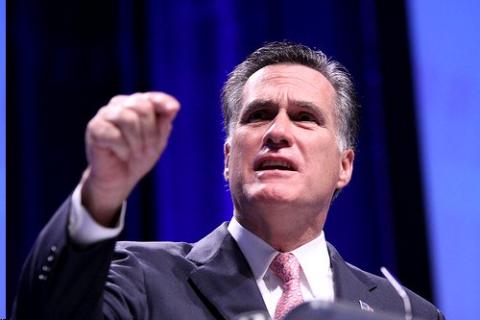Romney's Run

The presidential election of 1996 is remembered for being so entirely unmemorable. Running against a charismatic but controversial president, the challengers in the Republican field were a cast of pallid characters, one almost indistinguishable from the other, with the exception of a single firebrand (the ever-quotable Morrie Taylor). Sound familiar?
Next year, Americans will again be called to the voting booths to select their leader for the following four years. With President Obama presumably running unchallenged for the Democratic ticket, between now and then the nation’s eyes will be on the Republican Party and nominees.
Tension over the economy continues to rise as the recovery falters, and for 2012 the public seems to be looking for a candidate with business credentials to make the required fixes. Former governor of Massachusetts Mitt Romney fits that profile – under his watch the state went from a deficit of few billion to a surplus of several hundred million and, before he entered politics, he co-founded and ran an immensely successful private equity firm, Bain Capital. Romney could convincingly argue that, amongst Republican candidates, he possesses a unique blend of fiscal conservatism and proven business acumen that makes him the obvious choice for the Republican nomination.
On a practical level, Romney also has the advantage of campaign experience. He has been through an electoral cycle before so he knows what to expect and how to handle the myriad complications and unexpected developments that inevitably crop up over the course of many long months on the trail.
An interesting difference in the Romney of 2011 is his relatively low profile in these early stages of the campaign. As the Washington Post noted in a July editorial, in 2008 Romney was a ubiquitous presence on the trail and in the national media, the thinking being that as a lower-profile candidate, he needed as much exposure as possible to garner votes. This time around, however, he is taking a more reserved approach. Knowing that the economy is the foremost public concern for 2012, Romney is only making statements to the media about economic issues, specifically attacking the policies of the Obama administration and letting the voting public know what he would do differently. His financial expertise is the backbone of his campaign.
However, this strategy is not without its risks. A July New York Times profile notes that while Romney is still the frontrunner in terms of money and name recognition, he must at some stage engage his Republican opponents too, lest he give the impression he is not strong in the face of competition.
The Romney camp can also take heart from a recent Washington Post/ABC News poll that had the former governor in a dead heat with President Obama amongst all voters, and even holding a small lead amongst those already registered.
In the 2008 election, John McCain's strength was national security, and he was perceived as a strong candidate on security issues. But as worries over overseas entanglements diminish, financial acuity is the order of the day, and Romney is perhaps the most accomplished candidate in the field.
Romney does face a number of impediments to success, however. There is his spotty history (from a conservative standpoint) on social issues, his championing of universal healthcare in Massachusetts (a hindrance with the Tea Party crowd), his personal faith, and, finally, the perceived distance between him and regular Americans.
One of the great inequities of modern politics is that a shift of position is often condemned as "flip-flopping." Romney’s shifts on social issues like abortion (he was pro-choice in 2002 but is now firmly pro-life) are hard to interpret as much more than appeals to the conservative base. He has the business chops, but in the past has taken moderate stances on a number of social issues and therefore must make the appropriate expiations if he is to gain full conservative support.
This and the Massachusetts healthcare bill are perhaps the largest obstacles to Romney getting the nomination. His Mormon religion will end up being less of a problem than many pundits maintain. John F. Kennedy’s catholicism was considered a big question mark until his speech at the Greater Houston Ministerial Association in 1960 -- and Romney seems to have done enough to quell any discontent on this issue.
What does present a problem is the feeling that Romney is somehow disconnected from the average working American. It is not that he is unlikeable exactly; it’s that he is diffident to the very brink of aloofness and is also extremely wealthy. In American politics, one of the most powerful character traits a candidate can possess is a regular-guy persona, and ‘elitist’ is a negative label.
The other Republican candidates seem to satisfy the social demands of conservative voters, but most do not have the required business experience, and others suffer a lack of name recognition.
When one considers all factors – experience, name recognition, conservative values, the ability to pull from the all-important independent vote – on balance Romney’s chances look good.
But getting the Republican nomination and winning the presidency are two completely different things, so conservative voters face a difficult choice: Do they pick the candidate whose campaign platform most closely matches their priorities, or do they select their second, third, or fourth choice because they have a more realistic chance of beating President Obama?
Whatever happens over the next 14 months, it will be an interesting campaign season. At least it won’t be 1996 all over again.





























































































































































































































































































































